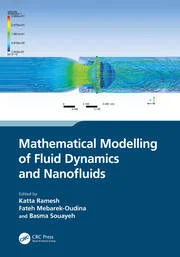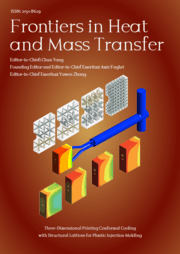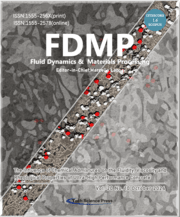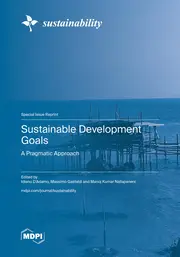Guidelines for Authors
Authors are kindly invited to submit a summary version of their papers, formatted according to the conference template, which can be downloaded from the conference website. Submissions must be in PDF or DOCX/DOC format.
All papers must be submitted via the Google Form and will undergo a double-blind peer review process.
Accepted papers will be presented either orally or as a poster. Authors will be notified of their designated presentation format upon acceptance.
- Submitted papers must present original, unpublished research not currently under review for publication elsewhere.
- Papers should be clearly written in grammatically correct English and follow a logical structure.
- The content should be directly relevant to the conference topics and contribute to the advancement of the field.
- Authors should provide a list of 3-5 keywords that accurately describe the paper's content.
- All figures and tables must be embeded within the manuscript. They must be clear, high-resolution, and have captions explaining their significance.
- Full name(s) and affiliation(s) of all authors should be included in the top of the paper.
- Only PDF and DOCX formats are accepted. DOCX template can be found at the following link: Download the template.
We encourage you to submit your high-quality research and contribute to a successful ICISE 2025!
For any inquiries, please contact the conference organizers at icise2025@univ-mosta.dz.
Publication Opportunities
Accepted papers will be published in conference proceedings (ISBN pending).
Best papers will be considered for publication in one of the following prestigious journals and edited books:
Submit Your Contribution Work
Authors are invited to submit their original research contributions to ICISE 2025 through the Google Form.
SubmitSpeakers
Dr. Mohamed DANI
Switzerland

Pr. Mikhail Sheremet
National Research Tomsk University, Russia

Pr. Sait Eren San
Kocaeli University, Izmit, Türkiye

Pr. MAHANTHESH BASAVARAJAPPA
University of Texas, USA

Pr. FENINECHE NOUREDINE
Université UTBM, France
Program
Scientific Program
Please select "Day1" or "Day2"
Registration
Reception.
Opening ceremony
President of the Mostaganem University: Pr. Hammou Amine Bouziane
Dean of the Faculty of Sciences and Technologies: Pr. Ghazzer Moufek Radouane
Chairman of the conference: Dr. OULD SAID Belkacem

Plenary Talk 1: Dr. Mohamed DANI (Switzerland).
President Plenary: Prof. BEGHDAD ATMANI, Prof. TOUNSI ABDELOUAHED
Coffee Break and First session Poster presentation

Plenary Talk 2: Prof. MIKHAIL A. SHEREMET (Univ. Tomsk State-Russia).
President Plenary: Prof. Rédha YOUNES BOUACIDA and Prof. BENHALILIBA MOSTEFA
Free lunch time.
First session of oral presentations
Room 1: Fluid dynamics and Nano-fluids
Session Chairs: Prof. N. RETIEL and Prof. A. BENBRIK & Prof. A. BENAZZA
(ICISE 25-01): GHEZAL Abderrahmane USTHB, Algeria.
Analytical and numerical study of pulsating double diffusive flows in annular space.
(ICISE 25-02): BELHANAFI Abdelghani USTO, Algeria.
Etude Comparative Hydrodynamique Génères Dans Deux Cuves Carrée Mono et Bi-étagé.
(ICISE 25-03): BOUBENDIR Lynda USTHB, Algeria.
Dynamics and Rupture of Liquid Bridges.
(ICISE 25-04): AIT AMIRAT Mokhtar Mostaganem University, Algeria.
Numerical study of mhd natural convection in a partially porous trapezoidal cavity filled with nanofluid
Room 2: Modeling and Simulation
Session Chairs: Prof. S. HOUAT and Prof. L. ADJLOUT & Prof. B. IMINE
(ICISE 25-05): BEN MESSAOUD Safinaz Laghouat University, Algeria.
Trajectory tracking control of an uncertain nonlinear elastic joint manipulator using feedback linearization with neural network compensation
(ICISE 25-06): BENSALEM Chafik Bouira University, Algeria.
Comparison study on H2/O2 and Ch4/O2 diffusion flame structures.
(ICISE 25-07): BOUKLI-HACENE Omar Tlemcen University, Algeria.
AI-driven hybrid modelling of complex bioprocesses for sustainable wastewater reuse: current advances and future challenges
(ICISE 25-08): Chenafi Mohamed Amine Ain Temouchent University, Algeria.
First-principles study of the structural, electronic, and phonon properties of Ag2 ZnSnS4.
Coffee Break and Second session Poster presentation
Room 1: Fluid dynamics and Nano-fluids
Session Chairs: Prof. MEKADEM MAHMOUD and Prof. OANNIS E. SARRIS, Prof. A. I. Ismail & Prof. B. IMINE
(ICISE 25-09): FAIZA SAIDJ USTHB, Algeria.
Effect of upstream configuration on hydrodynamic behavior of a vertical upward gas-liquid slug flow.
(ICISE 25-10): FAKHER Hamdi Gabes University, Tunisia.
Experimental Study of the Thermal Behavior of a ZNO-based Nanofluid.
(ICISE 25-11): Laouar Soufiane Nuclear Research Center of Birine, Algeria.
Simulation of the Effect of Nanofluids on Heat Transfer Characteristics Using a CFD Approach Coupled with a Neural Network.
(ICISE 25-12): ZIANI Lynda Bejaia University, Algeria.
Travelling waves at a controlled interface of a gravity- driven flow.
(ICISE 25-13): MEDEBBER A Mohamed Mascara University, Algeria.
Numerical Study of Combined surface radiation and Natural Convection in conical cavity field with nanofluid.
(ICISE 25-14): OULD SAID Belkacem Mostaganem University, Algeria.
Mixed Magnetohydrodynamic Nanofluid Convection in a Porous Square Domain.
Room 2: Modeling and Simulation
Session Chairs: Prof. S. LAOUEDJ and Prof. R. SAIM & Prof. O. IMINE
(ICISE 25-15): BILEL Zouzou USTHB, Algeria.
Numerical study of gas–liquid slug flow in horizontal mini-channels.
(ICISE 25-16): DJAHFA Salim Khenchela University, Algeria.
Estimating parameters values of battery lead-acid using Simulink Design Optimization.
(ICISE 25-17): MEZAACHE Abderahmane Skikda University, Algeria.
Comparative Analysis of Thermal Performance in Packed Granular and Foam Wavy Porous Channel Heat Exchangers.
(ICISE 25-18): FOUDIL Khelil Mascara University, Algeria.
Convection Heat Transfer in Extended Surfaces: An Experimental Perspective.
Registration
Reception.

Plenary Talk 3: Pr. Sait Eren San (Turkey).
President Plenary: Prof. BENBRIK ABDERRAHMANE & Prof. RIDHA ENNETTA
Coffee Break and Third session Poster presentation

Online Plenary Talk 4: Prof. MAHANTHESH BASAVARAJAPPA Univ. Texas - USA [Link].
President Plenary: Dr. MOKHTAR KHALDI, Prof. BENHALILIBA MOSTEFA and Dr. DJAMEL BELATRACHE
Second session of oral presentations
Room 1: Materials engineering
Session Chairs: Prof. H. GUECHICHI and Prof. B. BOUIADJRA & Prof. REBIAI ABDELKRIM
(ICISE 25-19): BOUDALI Badreddine USTHB, Algeria.
Superficial hardening of 316l alloy welded by rotary friction using the vibratory abrasion procedure.
(ICISE 25-20): KERBOUA bachir Tlemcen University, Algeria.
Interaction entre le Fonctionnement du Moteur Thermique et les gaz polluants Sur la consommation et l’Environnement.
(ICISE 25-21): BENASKEUR Naziha (Nuclear Research Center of Birine, Algeria.
Simulation of Electrochemical Dissolution of Silicon in Acidic Solutions for Nanomaterial Synthesis.
(ICISE 25-22): HAMZA Ayat Allah Ismahene Oran 2 University, Algeria.
Confection d’un mortier écologique à l’aide de poudre de pneus usagés.
(ICISE 25-23): Mokhtar Khaldi Mascara University, Algeria.
Enhancing mechanical and fracture performance of alfa fiber–reinforced polypropylene composites.
Room 2: Energy transition & Renewable energies
Session Chairs: Prof. D. NEHARI ; Prof. RIDHA ENNETTA, Prof. OULD LAHOUCINE Cherif and Prof. KABAR YASSINE
(ICISE 25-24): TSRIAT TAHANI Nor el houda ENP- Oran MA, Algeria.
Comparative study of MPPT technique Algorithms for Solar PV Systems under changing environment conditions.
(ICISE 25-25): GACEM Nadhir USTO, Algeria.
Cooling By Night Application of a Thermal Flat Collector: radiative sky cooling.
(ICISE 25-26): ABDELLI Islam Safia Mostaganem University, Algeria.
Integrating Landfill Biogas into Renewable Energy Systems: A Pathway for Algeria’s Energy Transition.
(ICISE 25-27): Ridha Zitouni Gabes University, Tunisia.
Hybrid metaheuristic–Levenberg-Marquardt approach for modeling and inverse estimation of fouling in phosphoric acid concentration processes.
Room 3: Artificial intelligence in the industrial
Session Chairs: Prof. M. MERAH and Prof. B. ATMANI & Dr. S. BENKERDAGH
(ICISE 25-28): BENZIANE Sarah USTO, Algeria.
A Review of Using AI for Process Control Optimization to Reduce Self-Consumption and Flared Gase.
(ICISE 25-29): OUAMARA Nourhene USTO, Algeria.
Detection of pollutants in coastal waters.
(ICISE 25-30): MAHIEDDINE Ikram Oran2 University, Algeria.
AI for Industrial Process Optimization: A Review of Impacts, Case Studies, and Critical Challenges.

Plenary Talk 5: Prof. FENINECHE NOUREDINE (Univ. UTBM- France).
President Plenary: Prof. Wafik Mohammed Khemici, Prof. MOURAD MAGHERBI
Closing ceremony
Lunch time
Scheduled visit to the various monuments of Mostaganem city
Poster Presentations
Please select "First Session" or "Second Session" or "Third Session"
Fluid dynamics and Nano-fluids
Session Chairs: Prof. KATTA RAMESH, Prof. OULD LAHOUCINE Cherif and Dr. Zina Meddeb
Numerical investigations of flow through a gradual widening.
Abdelaziz KHALDI
Mostaganem University, Algeria.
Improving the efficiency of photovoltaic solar cells using nanofluids.
ABDELLAHOUM Chahrazed
USTHB, Algeria.
CFD Study of multiphase flow erosion in pipe elbow.
LACHELAK Boutheyna
Constantine University, Algeria.
Interfacial capillarity- gravity waves in finite depths.
BOUGHAZI Dalila
USTHB, Algeria.
Numerical investigation of nanofluids jet impinging normally on a flat.
BENMOUHOUB Dahbia
USTHB, Algeria
Numerical study of new optical device for two-phase flow measurement.
HOCINE Hadjer
USTHB, Algeria.
Influence of Elliptical Cylinder Aspect Ratios on Magnetohydrodynamic Nanofluid Flow in Porous Cavities
OULD SAID Belkacem
Mostsganem University, Algeria.
Materials engineering
Session Chairs: Prof. BOUCHOUCHA ALI, Dr. CHAABANE RAOUDHA, Dr. BERRAHIL FARID
Numerical analysis of plastic deformation in notched pvc arched specimens under uniaxial tension
ZAIM Abdel-Nour
Mascara University, Algeria.
Comparative First-Principles Study of the Structural and Physical Properties of the Heusler Alloys TbInCu2 and TbInAg2
MESSAOUDI Souad Ilham
Ain-Temouchent University, Algeria.
Eco-friendly phenol removal using palm leaf: insights into adsorption efficiency and kinetics.
FODIL Zahra
Saida University, Algeria.
Numerical study of lsp on Ti-6al-4v and al 2024-t351 discs via johnson-cook model.
NAOUM Halima
Sidi Bel Abbes University, Algeria.
Static behavior of fg sandwich beams under various boundary conditions using trigonometric series solutions and rhsdt.
ADDOU Farouk Yahia
Mostsganem University, Algeria.
Numerical investigation of pcm-enhanced hollow clay bricks for cooling load reduction in hot climates
HADJADJ Mohamed
Ain Temouchent University, Algeria.
Energy transition & Renewable energies
Session Chairs: Prof. HARROUZ ABDELKADER, Prof. SMAIL BENISSAAD
Technical and economic assessment of urban rooftop photovoltaic systems for power generation in bamendil, ouargla (algeria).
MESSAOUDI Lazhar
Ouargla University, Algeria.
Designing a low-cost smart grid for rural areas using edge ai to support renewable energy integration.
KACI Meziane
Khemis Miliana University, Algeria.
Numerical study of heat transfer in buildings using mpcms for improved thermal performance.
LAOUAR Salima
CDER Ghardaïa, Algeria.
Advanced UV detection technology: MSM photo detector design integrated into ingan/algan/gan heterostructure.
BENYETTOU Aicha
Tlemcen University, Algeria.
Thermal valorization of sewage sludge.
KHELLADI Malika
Mostaganem University, Algeria.
Soil Thermal Response to Salinity Variations: Implications for Shallow Geothermal Energy in Arid Regions .
BENNACEUR Djihad
Mostaganem University, Algeria.
Modeling and Simulation
Session Chairs: Prof. HANUMESH VAIDYA, Prof. RIDHA ENNETTA
Numerical modeling and fracture analysis of cracked functionally graded thermal barrier coatings under thermo-mechanical loading.
TIFOUR Meriem Hidayet
Sidi Bel Abbes University, Algeria.
Vibration monitoring and mechanical fault diagnosis centrifugal finisher pump application.
OUALI Mohamed
Blida University, Algeria.
Molecular structure and theoretical analysis of 2-nitrophenyl 4-(octyloxy) benzoate for functional material applications.
Fatima Zohra BENAOUINA
Mostaganem University, Algeria.
Non-linear optical properties of two bioactive compounds: dmacb and dnbp (similar molecule) by dft study.
BOUBEGRA Naima
Mostaganem University, Algeria.
Fluid dynamics and Nano-fluids
Session Chairs: Prof. RIDHA ENNETTA, Prof. GHEZAL ABDERRHMANE
Optimization of the Flow of Submerged Spillways in Hydro-Geotechnical Structures for Sustainable Water Management in Industry and Energy.
MEBARKI Bachir
Jijel University, Algeria.
Numerical Analysis of Airflow and Heat Transfer in a Jet Impingement Solar Collector.
Mecieb Fatima Zohra
Sidi Bel Abbes University, Algeria.
Combined Effects of Magnetic Field Intensity and Ventilation Opening on Mixed Convection in a Nanofluid-Filled Cavity.
MODERRES Mourad
Khemis Miliana University, Algeria.
Modeling the Interaction Between Drilling Mud and PDC Bits Under Varying Flow Conditions.
Mekedeme Abdelah
Boumerdes University,Algeria.
Étude numérique de la Convection naturelle dans une cavité quadrantale remplie d’un nano fluide.
TOUATI H Imene
Mostaganem University,Algeria.
Mixed convective flow of hybrid nanofluid in a trapezoidal enclosure.
Nassim M. Sahraoui
Mostaganem University, Algeria.
MHD Natural convection of H2o/Cu nanofluid in a baffled square cavity
AIT AMIRAT Mokhtar
Mostaganem University, Algeria.
Vorticity Dynamics and Energy Dissipation in a Three-Sided Lid-Driven Cavity with Differentially Moving Walls
AZZOUZ Amine
Mostaganem University, Algeria.
Hydrodynamic Response of Two-Lobe Journal Bearings: Influence of Groove Arc Length and Power-Law Lubrication.
BENNACEUR Hadjar
Khemis Miliana University, Algeria.
Materials engineering
Session Chairs: Dr. METTATLA NOUREDDINE, Dr. Huda Fish and Dr. BENDOUKHA Mohamed
Comprehensive experimental characterization of the orthotropic behavior of a glass/epoxy laminated composite: elastic moduli, shear properties, poisson’s ratio, and numerical validation
LAKHDAR Abderrahmane
USTHB, Algeria.
Repair of corroded aluminum plates using a friction stir-based technique.
LAKLI Brahim
Relizane University, Algeria.
Experimental study of mechanical behavior of steel under galvanizing operation.
BABAKHALI Mohamed
Mascara University, Algeria.
Structure–property relationships in new organic semiconductors for bulk heterojunction solar devices: a computational approach.
BELKAFOUF Nour EL houda
Mostaganem University, Algeria.
Numerical simulation of grafting density on phosphonate-functionalized silicon nanoparticles.
OTSMANE Rachida
Nuclear Research Center of Birine, Algeria.
Numerical Stress Modeling Using FEM in Patient-Specific Design of Removable Complete Dentures.
MADOUNE Yassine
Mostsganem University, Algeria.
Local mechanical characterization enhancement of epoxy resin reinforced with carbon nanotube additives.
BELOUFA Imène
Mostsganem University, Algeria.
Energy transition & Renewable energies
Session Chairs: Dr. NOUICER ILYES, Dr. GUERBAI SALAH and Dr. MEDJAHED Bendida
Blocking factor influence on heliostat field efficiency in solar tower plants.
BOUAMRA Messaoud
Relizane University, Algeria.
Analytical versus simulation-based sizing of stand-alone photovoltaic systems using pvsyst.
CHOUITEK Mama
Oran 2 University, Algeria.
Study of the electronic and optical properties of the compounds na2mge2te6 (m=cd, zn, hg).
MAHIAOUI Rekia
Tlemcen University, Algeria.
Optimizing energy conversion: power electronics in pv-ro desalination systems.
BELKACEM M. FILALI
Blida University, Algeria.
Improving thermal transport in a latent heat thermal energy storage system using aluminum fins.
MISSOUM Khawla
Tlemcen University, Algeria.
Shallow geothermal energy: a permanent solution for heating and cooling under our building.
MHALA Toufik
Mostaganem University, Algeria.
Influence of alumina (AL2O3) nanoparticles on heat transfer enhancement of phase change material (RT54HC).
HADDAM Amine
Mostaganem University, Algeria.
Modeling and Simulation
Session Chairs: Prof. SMAIL BENISSAAD, Prof. MEDEBER MOHAMED AMINE
Numerical simulation of mixed-mode fracture in homogeneous materials.
HEBBAR IMENE
Mostaganem University, Algeria.
Numerical computations of mhd natural convection flow of ferroflud in a U-shaped cavity.
Nassim M. Sahraoui
Mostaganem University, Algeria.
Dynamic Deployment of Horizontal Partitions for Efficient CO Dispersion and Ventilation in a 2D Industrial Domain: A CFD Approach.
SENOUCI Moussa
Mostaganem University, Algeria.
Materials engineering
Session Chairs: Prof. BOUCHOUCHA ALI, Prof. ZENASNI RAMDANE and Dr. KHELIL FODIL
Etude de l’impact des conditions climatologiques sur les propriétés du matériau plastique d’une serre agricole..
AOUINET Mechri
Tiaret University, Algeria.
Improving performance of dye-sensitized solar cells using TiO2 and ZnO nanostructures.
ZELLAG Saliha
Bejaia University, Algeria.
Comprehensive examination of the properties and applications of smart perovskites materials for renewable energy applications.
ZINEB fares
Mostaganem University, Algeria.
A new analysis of nonlinear free vibration behavior of bi functionally graded sandwich SHELL using the p-version of the finite element method.
BENDAHOU Tawfiq
Tlemcen University, Algeria.
A Sound Perception Approach to Fault Detection in Rotating Machinery.
DIF Sofiane
USTHB, Algeria.
Mechanical Characterization in Three-Point Bending of Sandwich Pipelines with Sand Core.
CHENINE Halima
Mostaganem University, Algeria.
Mechanical Characterization of Recycled and Loaded Materials.
BOUSSENA Ahmed
Sidi Bel Abbes University, Algeria.
Energy transition & Renewable energies
Session Chairs: Prof. ADJLOUT LAHOUARI, Prof. BOURAS FETHI, Dr. GUERBAI SALAH
Simulation and optimization of mapi based perovskite solar cells with ZnO as electron transport layer.
OTMANI Fatima Zohra
Tlemcen University, Algeria.
Impact of climatic region on the thermal performance of heat pumps in shallow geothermal systems.
MOUSSAOUI Salah Eddine
Mostaganem University, Algeria.
Numerical simulation and performance optimization of tandem organic solar cell with improved efficiency.
BENSENOUCI Souhila
Tlemcen University, Algeria.
Evaluation of electromagnetic field interactions with the human body during the oued el abtal power outage on the bir ghbalou-hassi ameur 400kv power line.
Houari Toufik Ahmed
Mascara University, Algeria.
Impact of dust deposition on the electrical performance of photovoltaic modules.
Houari Toufik Ahmed
Mascara University, Algeria.
Thermoelectric properties of new half heusler alloys for renewable energy.
Mouffok Youcef
Mostaganem University, Algeria.
Optimizing PCM integration for improved thermal regulation in clay bricks: impact of pcm positioning on heat transfer.
ZEHOUANI Zahra Assala
Ain Temouchent University, Algeria.
Geomechanical modeling of rock integrity during co2 sequestration operations.
BELIMANE Zakarya
Boumerdes University, Algeria.
Artificial intelligence in the industrial
Session Chairs: Dr. M. BENTOUMI and Dr. D. HAMAMI & Dr. K. SEHABA
Rolling Bearing Defect Diagnosis based on Variational Mode Decomposition and an Improved Thresholding Method..
RABAH ABDELKADER
Khmeis Miliana University, Algeria.
Application of Random Forest Classification to Intelligent Predictive Maintenance: An Industrial Case Study..
AOUIMER Yamina
Oran 2 University, Algeria.
An IoT-Edge Embedded System with Predictive Artificial Intelligence for Proactive Monitoring of High-Vigilance Hospital Patients.
MENASRIA Massiva
ENP Oran, Algeria.
Optimization Multi-objective of Heterogeneous Systems under Reliability Constraints Using Bat Algorithm.
CHAKER Abdelkrim
Saida University, Algeria.
Data-Driven Digital Twin for Centrifugal Compressor Discharge Pressure Prediction.
SABRI Khier
Boumerdes University, Algeria.
Artificial Intelligence for Thermal–Hydraulic Optimization of Tube Bank Heat Exchangers with Splitter Plates.
SENOUCI Moussa
Mostaganem University, Algeria.
Modeling and Simulation
Session Chairs: Prof. HANUMESH VAIDYA, Dr. GUERBAI SALAH
Numerical Study of Natural Convection in a Partially Open-Ended Enclosure Heated by Bellow wit the Lattice Boltzmann Method.
ABDELMALEK Noureddine
Mostaganem University, Algeria.
Calibration of an activated sludge model no.1 using experimental data from the tlemcen wastewater treatment plant.
KADA KLOUCHA Omar
Sidi Bel Abbes University, Algeria.
advanced modeling and performance optimization of a monocrystalline photovoltaic cell for embedded solar systems.
SEDJAR Sarah Kawther
ENP Oran, Algeria.
Reynolds number and groove modifications impact on jet impingement cooling of electronic devices.
ATTOU Youcef
Mostaganem University, Algeria.
A CFD model of the effect of spherical silver particle size on hydrogen peroxide decomposition in monopropellant thruster .
BENZENINE Fadéla
Tlemcen University, Algeria.
Numerical study for Two Lid driven L–Shaped Cavity with Two-Relaxation Time (TRT) Lattice Boltzmann Model.
HOUAT Samir
Mostaganem University, Algeria.
Online Presentations

Online Plenary Talk 4: Prof. MAHANTHESH BASAVARAJAPPA Univ. Texas - USA [Link].
President Plenary: Dr. MOKHTAR KHALDI, Prof. BENHALILIBA MOSTEFA and Dr. DJAMEL BELATRACHE
Third session Poster presentation
Fluid dynamics and Nano-fluids
Session Chairs: Dr. MOKHTAR KHALDI and Dr. DJAMEL BELATRACHE
(ICISE 25-I 01): BENNACEUR Mohamed Amine Algerian space agency, Algeria.
Non-Premixed Combustion Analysis in Liquid Rocket Engine Chambers.
Energy transition & Renewable energies
Session Chairs: Dr. MOKHTAR KHALDI and Dr. DJAMEL BELATRACHE
(ICISE 25-I 02): Baala Seddik Enhanced Grid Stability in PV Systems Through Integrated MPPT and Deep Neural Network-Based VSC Control.
Adrar University, Algeria.
(ICISE 25-I 03): DAHHOU BRAHIM Study and Control of a Wind System Based on Doubly Fed Induction Machine.
USTHB, Algeria.
(ICISE 25-I 04): Saddam Hocine Mellah The investigation of the impact of the inclination of U-shaped Fins tubes on the thermal storage of copper nanoparticle-enhanced PCM in an octagonal unit.
Mascara University, Algeria.
(ICISE 25-I 05): Hafidha BOUCHAABA Application of Solar Technology in the Treatment of Wastewater Contaminated by Textile Effluents.
Mascara University, Algeria.
(ICISE 25-I 06): Nadia Bouaziz Modeling and Simulation of Perturb and Observe MPPT Control for PV Systems Using MATLAB/Simulink.
Tizi-Ouzou University, Algeria.
(ICISE 25-I 07): KRAMOU Ilhem Comparison of DC-DC Boost converters for photovoltaic applications.
Blida University, Algeria.
(ICISE 25-I 08): GUERROUT Abdessamed Numerical Modeling of Thermal Transfer in Mortar Wall with mPCM using COMSOL Multiphysics.
Mostaganem University, Algeria.
(ICISE 25-I 09): CHAICH Zineb Évaluation expérimentale de la perte de rendement des panneaux photovoltaïques induite par l’accumulation de poussière.
Ouargla University, Algeria.
Materials engineering
Session Chairs: Prof. HARROUZ ABDELKADER and Prof. BENHALILIBA MOSTEFA
(ICISE 25-I 10): Guerine Mohammed Houssem Eddine Analytical Solution for Free Vibration Analysis of FG-CNTRC Plates Using a New Integral High-Order Shear Deformation Theory.
Naama University, Algeria.
(ICISE 25-I 11): Boukhalkhal Nabila Ahlam Free Vibration analyses of Antisymmetric laminated Carbon Nanotube-reinforced functionally graded laminated plates.
Djelfa University, Algeria.
(ICISE 25-I 12): Djelid Khadidja Boosting the Efficiency of Thermoelectric Modules through Strain Engineering.
Mascara University, Algeria.
(ICISE 25-I 13): Meftah Souad Multi-Scale Computational Modeling Coupled with Experimental Validation of Talc/Polypropylene Composites Using Digimat Mean-Field Homogenization.
Mascara University, Algeria.
(ICISE 25-I 14): BORDJIBA Zeyneb Guelma University, Algeria.
Substitutional strategies for magnetic transformation in two dimensional pts2.
Modeling and Simulation
Session Chairs: Dr. MOKHTAR KHALDI and Dr. HICHEM NECIB
(ICISE 25-I 15): Romaissa Hachana Revisiting Critical Ventilation Velocity in Tunnel Fires: A CFD-Based Evaluation of Additional Geometric Influences.
Blida University, Algeria.
(ICISE 25-I 16): Djamel Belatrache CFD Simulation for enhancing heating room efficiency using a Trombe wall.
Ouargla University, Algeria.
(ICISE 25-I 17): Aissa Gounni 3D CFD study of a geothermal heat exchanger in the region of Ouargla.
Ouargla University, Algeria.
(ICISE 25-I 18): NEHAOUA Nadia A comparative study on the physical performance of silicon heterojunction photovoltaic cells.
Boumerdes University, Algeria.



